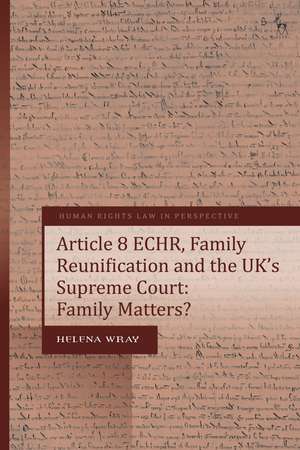Article 8 ECHR, Family Reunification and the UK’s Supreme Court: Family Matters?: Human Rights Law in Perspective
Autor Helena Wrayen Limba Engleză Paperback – 7 aug 2024
| Toate formatele și edițiile | Preț | Express |
|---|---|---|
| Paperback (1) | 305.53 lei 3-5 săpt. | |
| Bloomsbury Publishing – 7 aug 2024 | 305.53 lei 3-5 săpt. | |
| Hardback (1) | 511.40 lei 6-8 săpt. | +110.56 lei 6-10 zile |
| Bloomsbury Publishing – 8 feb 2023 | 511.40 lei 6-8 săpt. | +110.56 lei 6-10 zile |
Din seria Human Rights Law in Perspective
- 30%
 Preț: 571.99 lei
Preț: 571.99 lei - 28%
 Preț: 376.06 lei
Preț: 376.06 lei - 22%
 Preț: 251.39 lei
Preț: 251.39 lei - 30%
 Preț: 510.68 lei
Preț: 510.68 lei -
 Preț: 357.30 lei
Preț: 357.30 lei - 23%
 Preț: 187.33 lei
Preț: 187.33 lei - 30%
 Preț: 511.72 lei
Preț: 511.72 lei - 24%
 Preț: 189.87 lei
Preț: 189.87 lei - 22%
 Preț: 273.71 lei
Preț: 273.71 lei - 28%
 Preț: 495.80 lei
Preț: 495.80 lei - 14%
 Preț: 541.28 lei
Preț: 541.28 lei - 28%
 Preț: 498.33 lei
Preț: 498.33 lei - 30%
 Preț: 569.29 lei
Preț: 569.29 lei - 28%
 Preț: 435.66 lei
Preț: 435.66 lei - 30%
 Preț: 571.16 lei
Preț: 571.16 lei - 30%
 Preț: 569.06 lei
Preț: 569.06 lei - 30%
 Preț: 574.10 lei
Preț: 574.10 lei - 30%
 Preț: 514.01 lei
Preț: 514.01 lei - 28%
 Preț: 499.58 lei
Preț: 499.58 lei - 20%
 Preț: 220.75 lei
Preț: 220.75 lei - 30%
 Preț: 539.84 lei
Preț: 539.84 lei - 11%
 Preț: 498.73 lei
Preț: 498.73 lei - 22%
 Preț: 253.58 lei
Preț: 253.58 lei - 22%
 Preț: 265.00 lei
Preț: 265.00 lei - 18%
 Preț: 300.90 lei
Preț: 300.90 lei - 18%
 Preț: 355.76 lei
Preț: 355.76 lei - 18%
 Preț: 298.25 lei
Preț: 298.25 lei - 18%
 Preț: 298.43 lei
Preț: 298.43 lei - 28%
 Preț: 466.39 lei
Preț: 466.39 lei -
 Preț: 308.74 lei
Preț: 308.74 lei - 28%
 Preț: 375.61 lei
Preț: 375.61 lei - 19%
 Preț: 707.26 lei
Preț: 707.26 lei
Preț: 305.53 lei
Preț vechi: 373.82 lei
-18% Nou
Puncte Express: 458
Preț estimativ în valută:
58.46€ • 63.70$ • 49.26£
58.46€ • 63.70$ • 49.26£
Carte disponibilă
Livrare economică 02-16 aprilie
Preluare comenzi: 021 569.72.76
Specificații
ISBN-13: 9781509966073
ISBN-10: 1509966072
Pagini: 320
Dimensiuni: 156 x 234 x 25 mm
Greutate: 0.39 kg
Editura: Bloomsbury Publishing
Colecția Hart Publishing
Seria Human Rights Law in Perspective
Locul publicării:London, United Kingdom
ISBN-10: 1509966072
Pagini: 320
Dimensiuni: 156 x 234 x 25 mm
Greutate: 0.39 kg
Editura: Bloomsbury Publishing
Colecția Hart Publishing
Seria Human Rights Law in Perspective
Locul publicării:London, United Kingdom
Caracteristici
Of interest to a wide range of human rights, immigration, and public lawyers, as well as policy advisers and NGOs
Notă biografică
Helena Wray researches and teaches Migration Law at the University of Exeter, UK
Cuprins
1. Introduction: Family Reunification, Human Rights and Judges I. About the Book II. Chapter OutlineIII. Family Reunification IV. Human Rights and Family LifeV. Judges VI. Methodology 2. Introduction to the UK's Constitutional, Court and Immigration System I. Introduction II. The UK's Legal and Constitutional Framework III. The Human Rights Act 1998 IV. Regulating Family Reunification in the UK V. The Immigration Control Framework in the UK VI. Appeals and the Court System VII. Conclusion 3. The European Court of Human Rights: Strait is the Gate I. Introduction II. Why is Family Reunification and Article 8 So Problematic? III. Article 8(1): Family Life IV. Article 8(2) Proportionality 1: Immigration Controls, Positive Obligations and the Margin of Appreciation V. Article 8(2) Proportionality 2: Fair Balance VI. Conclusion 4. Huang: Breathing Life into Article 8 I. Introduction II. The Immigration Battleground III. A Sense of Judicial Purpose IV. The Legal Problem Addressed by Huang V. The Legal Findings in Huang VI. 'Human Beings are Social Animals' VII. The Aftermath of Huang VIII. The Signifi cance of Huang and its Limits IX. Conclusion 5. 'Good News from on High': The First Post-Huang Phase I. Introduction II. Beoku-Betts: Including All the Family III. Chikwamba: Applying In-Country or Abroad IV. EB (Kosovo): Delay, Proportionality and Reinforcing Huang V. Reflections on the First Phase Decisions VI. Conclusion 6. Still Family First: The Second Post-Huang Phase I. Introduction II. Baiai: The Right to Marry III. Mahad: Third Party Support IV. ZH (Tanzania): The Best Interests of Children V. Quila: Forced Marriage and the Minimum Age for Sponsorship or Entry VI. A Complex Relationship with Article 8 VII. Conclusion 7. The Supreme Court Rolls Back: The Third Post-Huang Phase I. Introduction II. A New Background III. Ali and Bibi: Pre-entry Language Testing 0IV. MM (Lebanon): The Minimum Income Requirement V. Agyarko: Regularisation and Precariousness VI. Reflections on the Third Phase Decisions VII. Reflections on Huang and the Three Phases VIII. Conclusion 8. A Better Article 8 is Possible I. Introduction II. Why Human Rights? III. Stick or Twist? The Case for Treating Family Reunification as a Positive Obligation IV. Family Life Beyond the 'Core' Family V. The Public Interest 1: The 'General Interest' and Family Life VI. The Public Interest 2: Immigration Control VII. Precarious Residence and Exceptionality VIII. Sponsors and Citizenship IX. Family Life and Immigration: The New Approach in Practice X. Conclusion 9. Concluding Remarks I. Introduction II. The Impact of Article 8 on Immigration Policy III. The Supreme Court as a Moral and Political Actor IV. A Coherent Legal Interpretation of Article 8 V. Final Words: Making Family Matter
